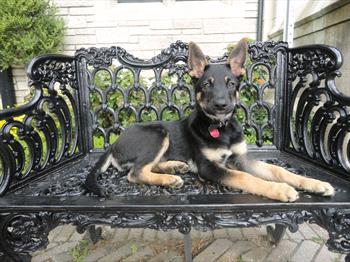Question:
Today I went to get my pup’s last set of shots. This was the third visit to the vets. Axel did some growling and tail between the legs, but, over time, he became a little comfortable with the vet and the vet tech. He was still uneasy though– ears back, tail curled, and doing a little growl. He felt more comfortable with me holding him (when I let the vet tech take over he just wanted to jump off the table). Well anyways, I was a little surprised when the vet put his face up to my 15 week old pup’s face! He was “asking” for a kiss– more like a bite! I know Axel was going to snap at him, but I gave him the “don’t you dare” look. The vet would do this several times, and Axel would assume the position and turn his face towards me as if saying “Help me, Mom– he’s bothering me”. I didn’t know how to tell the vet to stop, so I would just look at Axel and pet his head to calm him down.
Well, I guess my question is: what can I say to my vet next time I go? I’m a little worried about stepping on his toes and also what if next time Axel does bite him?
-Sara Renee Spiel
Answer:
The good news is that your veterinarian loves animals, which is why he tried to kiss Axel. So it should be easy to get him to modify his interaction next time if you approach the subject in the right way. That means providing information from a credible source to back up your assertions and also to take steps on your side to help alleviate Axel’s fears. Here’s what I would do.
Write a Letter to Your Veterinarian
Write a letter to your veterinarian thanking him for his veterinary care and expressing that you appreciate his love for pets. Then bring up your concerns about your puppy’s fear and describe the signs your puppy was showing. You can even download and print out the Body Language of Fear and Anxiety in Dogs flyer and circle the signs your dog was showing.
You can state that you think the veterinarian may have noticed which is why he tried to comfort Axel by kissing, but that you’ve read that kissing, hugging and approaching scared dogs head on actually causes them to become more fearful to the point where they may bite. At this point, you can download the How to Greet a Dog and What to Avoid poster/flyer for him to see. You can provide links to these articles:
- Preventing Dog Bites by Learn to Greet Dogs Properly
- How to Greet a Dog
- When a Kiss Can Get You Bitten: Lessons from Denver
- Compassionate Vet Care: Handling Pets in a Pet-Friendly Manner
Since you’re planning to stay with this veterinarian, I’d express that you’d love to stay with him but are concerned that he and his staff may get bitten when they unconsciously interact in ways that cause more fear. Also, express that you’re concerned such events can make Axel worse and that you know you have some work to do on your end. You can send them these links to give them an example of what you will be working on.
- Puppy Socialization: Stop Fear Before It Starts
- Preventing Dog Bites: Stop Dog Aggression Before It Starts
Ask if you can bring Axel in outside of his regular exam just to receive treats and learn that good things happen in the hospital setting. You might even ask if you can purchase some exam time where the veterinarians or technicians give treats and approach him correctly so that he looks happy and is showing no signs of fear. You might suggest that they brush up on the greeting technique prior to such an examination and even refer to chapters 2 and 14 in Low Stress Handling, Restraint and Behavior Modification of Dogs & Cats, which specifically address approaching and examining difficult pets in a way that keeps the pets happy and the humans safe.
What If Their Other Handling Skills Seem to Need Improvement?
If you feel your hospitals technicians and veterinarians also need improvement on how to handle and restrain your pet beyond just the initial greeting, you may also want to refer them to the textbook Low Stress Handling, Restraint and Behavior Modification of Dogs & Cats. While this textbook has been adopted into some veterinary and technician programs, it’s not used by all of them yet. Veterinarians who see a demand by their clients for more skilled handling that shows they care about your pet will become more and more willing to take the time to learn and have their staff update their skills. They can update their skills by attending behavior lectures at veterinary conferences, attending one of my Low Stress Handling seminars or labs (link to seminar schedule page), participating in our online Low Stress Handling Certification, or purchasing our Low Stress Handling DVDs, especially our Dog and Cat Handling DVDs.
Will My Veterinarian Care?
Most veterinarians, when provided with credible information—such as from a textbook or veterinary source—are willing to improve their skills when clients approach the situation in the right way. By taking that step to express your concerns and provide access to credible and widely accepted information, you, your pet and your veterinarian will benefit!



